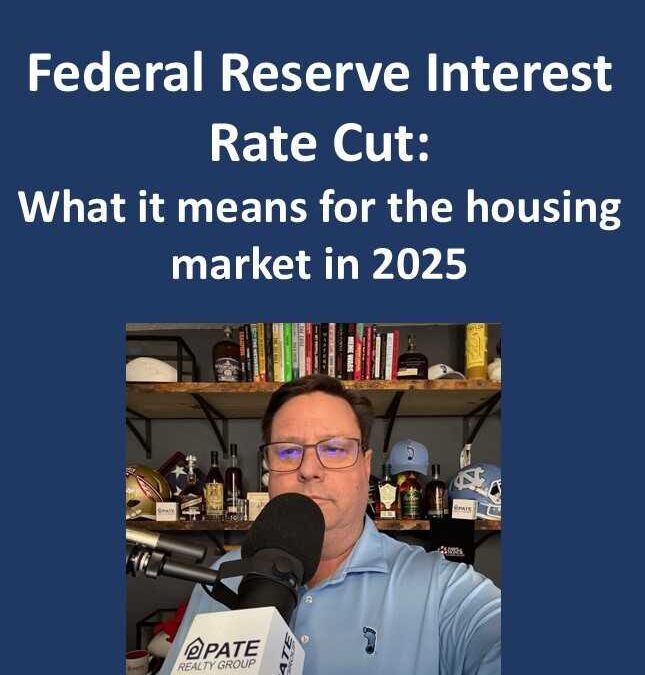Federal Reserve Interest Rate Cut: What It Means for the Housing Market
The Federal Reserve is widely expected to implement another interest rate cut this week, marking the third consecutive reduction since September. This potential rate adjustment comes as part of the Fed’s efforts to balance inflation control and economic growth while navigating uncertain economic conditions.
For real estate investors, buyers, and homeowners, these decisions carry significant implications. Mortgage rates, affordability, and housing demand are all influenced by the Federal Reserve’s monetary policy, making this development worth understanding.
The Federal Reserve’s Approach to Interest Rates
Over the past year, the Fed has steadily lowered interest rates to support economic stability. After holding rates at elevated levels to combat inflation, officials began cutting borrowing costs in September with a significant half-point reduction, followed by another quarter-point cut last month. If the Fed proceeds with an additional rate cut this week, it will mark a total reduction of 0.75 percentage points.
This phased approach to interest rate cuts highlights the Fed’s cautious optimism regarding the economy. The central bank has suggested that these early cuts were necessary due to elevated borrowing costs and their delayed confirmation that inflation was trending downward. However, going forward, the pace of rate reductions could slow.
Some Federal Reserve officials have expressed concerns about further cuts without concrete evidence of economic slowdown or a clear downward trend in inflation. This hesitation reflects the Fed’s balancing act: lowering rates too aggressively could reignite inflation, while moving too slowly might hinder growth.
The Changing Cost of Buying A New Home vs An Older Home
How Rate Cuts Affect Mortgage Rates
The Fed’s decisions on interest rates do not directly set mortgage rates but significantly influence them. When the federal funds rate decreases, borrowing costs across the economy typically decline, including mortgage interest rates. Lower mortgage rates can improve affordability for homebuyers and increase demand in the housing market.
As of now, mortgage rates remain higher than historical averages but are beginning to show signs of easing. A further reduction in interest rates this week could encourage lenders to offer lower rates, which may spur activity among both first-time homebuyers and refinancers. If you’re considering purchasing a home, this potential rate cut could create a window of opportunity to secure a more favorable loan.
What This Means for Real Estate Investors
For real estate investors, lower interest rates present a variety of opportunities. Cheaper borrowing costs can make it more affordable to finance investment properties or refinance existing loans. Additionally, increased buyer demand driven by lower mortgage rates may lead to stronger appreciation in home values.
However, investors should approach this cautiously. While a rate cut could stimulate the housing market, other economic factors, such as inflation and labor market performance, remain in flux. The Fed has indicated that future cuts will depend on clearer evidence of economic weakness or sustained inflation progress.
For investors looking to capitalize on lower rates, now may be the time to explore refinancing options, purchasing new properties, or leveraging equity in existing investments.
Key Terms for Home Buyers To Know
Potential Challenges and Uncertainty
While rate cuts can be positive for the housing market, the path forward is not without challenges. Some Federal Reserve officials argue that economic conditions, such as a still-resilient labor market, do not justify further rate cuts. If the economy remains strong and inflation stabilizes at current levels, the Fed may slow or halt additional rate reductions.
Moreover, rising asset prices—including stocks and cryptocurrencies—could present risks. Lower interest rates can fuel speculative spending, which could complicate efforts to bring inflation fully under control. If the housing market experiences rapid price appreciation due to increased demand, affordability concerns could resurface, particularly for first-time buyers.
Broader Economic and Political Factors
Adding to the uncertainty is the upcoming presidential administration and its potential policy changes. The Fed is closely monitoring proposals related to trade, immigration, taxation, and regulation, as these could reshape economic conditions.
For example, tighter immigration policies could impact wage growth and labor supply, while new tariffs could drive up costs for businesses and consumers. Such changes could indirectly affect housing demand and overall economic growth. The Federal Reserve has signaled it will take a cautious, data-driven approach, avoiding speculation about political developments until policies are finalized.
What Homebuyers Should Watch For
If you are planning to buy a home or refinance, staying informed about interest rates is essential. Here are key takeaways for homebuyers:
- Mortgage Rates Could Fall: A rate cut this week could lead to lower mortgage rates, improving affordability and saving buyers money over the life of a loan.
- Increased Competition: Lower rates may drive more buyers into the market, leading to increased competition for homes.
- Timing is Critical: Act quickly if rates decline, as housing markets can shift rapidly in response to economic changes.
How Sellers Can Benefit
For sellers, lower interest rates can attract more buyers, potentially leading to quicker sales and stronger offers. If you’re considering listing your property, a favorable interest rate environment could help you maximize your home’s value.
Final Thoughts
The Federal Reserve’s potential interest rate cut this week is a positive signal for the housing market, providing relief to homebuyers and investors alike. Lower borrowing costs can stimulate activity, improve affordability, and offer new opportunities for real estate professionals and buyers.
However, uncertainty remains. The Fed’s approach to future rate decisions will depend on inflation trends, labor market conditions, and evolving political factors. As we look ahead, staying informed about economic developments and mortgage rate trends will be key for anyone navigating the real estate market.
For real estate professionals, now is the time to educate clients about these changes and help them make informed decisions. Whether you’re buying, selling, or investing, understanding how interest rates affect the market will allow you to capitalize on opportunities as they arise.

